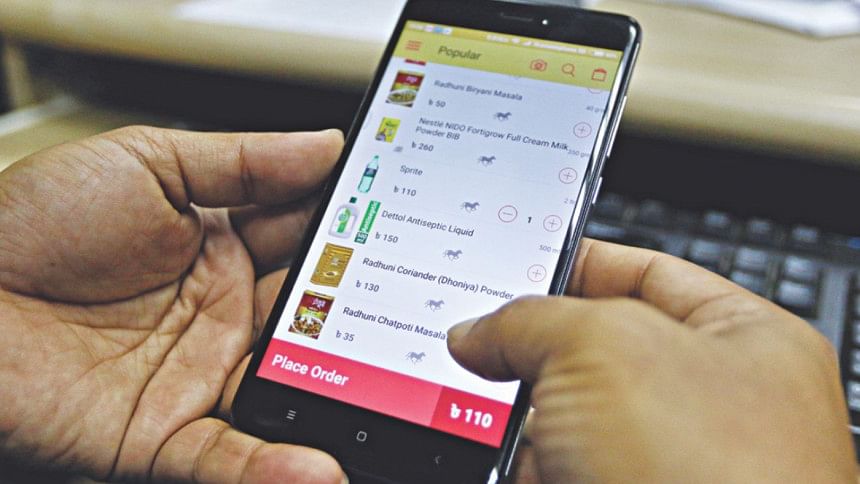Shopping habits changing as online retailers spring up

The doorbell rang twice, which made Fazilatun Nesa peek through the peephole.
A tall young man was at the other side of the door, with a package in hand.
She opened the door and the deliveryman handed over the bill for the package, which had several kilogrammes of rice, lentil, potatoes and some other items.
She had ordered the groceries from an online store -- a first for the household. The order was placed at 9.30am for delivery between 10-11am.
It arrived half an hour late, but she did not mind considering the traffic situation in Dhaka city.
All in all, Fazilatun was satisfied with her first online transaction, which restocked her kitchen supplies without her leaving the house.
Like Fazilatun, a growing number of professionals are doing their shopping online to get relief from the inconvenience of sitting through a traffic jam to get to a bricks-and-mortar store.
“I can place orders to various e-commerce sites sitting in my office or residence without spending hours in the market to buy the same products,” said Maqsud Hussain Zico, a banker, who has been shopping from digital marketplaces since 2013.
Operators said there are around 100 e-commerce sites -- such as chaldal.com, rokomari.com -- that deliver almost all groceries.
In recent times, traditional supermarket chains Shwapno and Meena Bazar have joined the fray, providing more options to online grocery shoppers.
Today, buyers place more than 30,000 orders daily and 65 percent of the orders are generated from Dhaka and its surrounding areas, Chittagong and Sylhet.
The rest of the orders come from outside metros, according to data from major operators. Annually the purchases generate Tk 700 crore in turnover.
The market size was about Tk 200 crore 4-5 years ago, said some industry operators earlier.
“Online purchase is a need of the time particularly in Dhaka,” Zico said.
The bourgeoning growth of online shopping has also opened job opportunities for youths. The number of direct and indirect jobs will be more than 50,000, according an estimate by major operators.
During the initial days, Zico was hesitant about making major purchases online.
“There had been confusion if I would get delivery. I was also unsure about the security of online transaction. Over time such worries have faded as things have improved vastly.”
There had been a lack of professionalism among the online shops. Sometimes expected products were not supplied and delivery did not take place as promised.
Now, the number of mistakes has declined and the overall service standard has improved, he added.
Jannatul Ferdoushy, another banker, said online shopping and home delivery have made her life easier.
“It is not possible to get a supporting hand always. Here, you get deliveryman who delivers products to the guards of the apartment if payment is made electronically,” she said.
Yet, problems are still there. For instance, timely delivery remains an issue.
Mareom, who has been buying essential stuff from online markets such as Chaldal or Daraz for the last two years, has faced long delays in getting her products on more than a couple of occasions.
She had to stay up until midnight to get delivery of her groceries for cooking dinner; the delivery time slot she would choose would be 7-8pm.
Seeing the delay in delivery she would ring the number provided on the receipt to enquire about her order for only to be told that the deliveryman was on the way.
“They should inform in advance if there is any delay. Companies should respond quickly to customers and improve service standard,” she added.
Zico echoed the same.
“Timely delivery is vital for us. One may have prepared his schedule based on the delivery time. And delay affects our other plans,” he said.
Waseem Alim, chief executive of Chaldal, a popular online grocery retailer in Dhaka, said his company delivers orders on the same day, whereas other e-commerce firms deliver one or more days after the placement of orders by customers.
“We deliver 70-80 percent of the orders to customers timely.”
The rest of it they are unable to deliver timely because of unexpected events such as poor road condition, time loss during delivery to other customers in the same area and problem in vehicles.
“It is about unpredictability. We are working to develop software through which customers will be able to track location of deliverymen,” said the CEO of Chaldal, which delivers 1,700 orders daily in Dhaka.
A year ago, the company delivered 750 orders a day. “We expect the flow of orders to increase four-five folds in the next couple of years,” he said.
Delays take place mostly on deliveries outside of Dhaka, said AKM Fahim Mashroor, chief executive officer of ajkerdeal.com.
Lack of reliable courier service provider in suburban areas and uncertainty about the traffic situation are the two main reasons behind the failure to ship orders in scheduled time to customers.
The problem of getting reliable courier could be overcome if the government assigns the Bangladesh Post Office to deliver the parcels generated through e-commerce, he said.
Customer satisfaction is important for e-commerce companies to do better. Increased competition will help solve the problems of delayed delivery and improve services, he said.
Large companies offer refunds and accept returns in case of problems with the products delivered.
But the level of customer dissatisfaction is high for Facebook-based service providers, according to Mashroor, a former president of the Bangladesh Association of Software and Information Services.
“But as a new sector, all the issues cannot be solved quickly. It will take time for everything to function properly.”

 For all latest news, follow The Daily Star's Google News channel.
For all latest news, follow The Daily Star's Google News channel. 






Comments